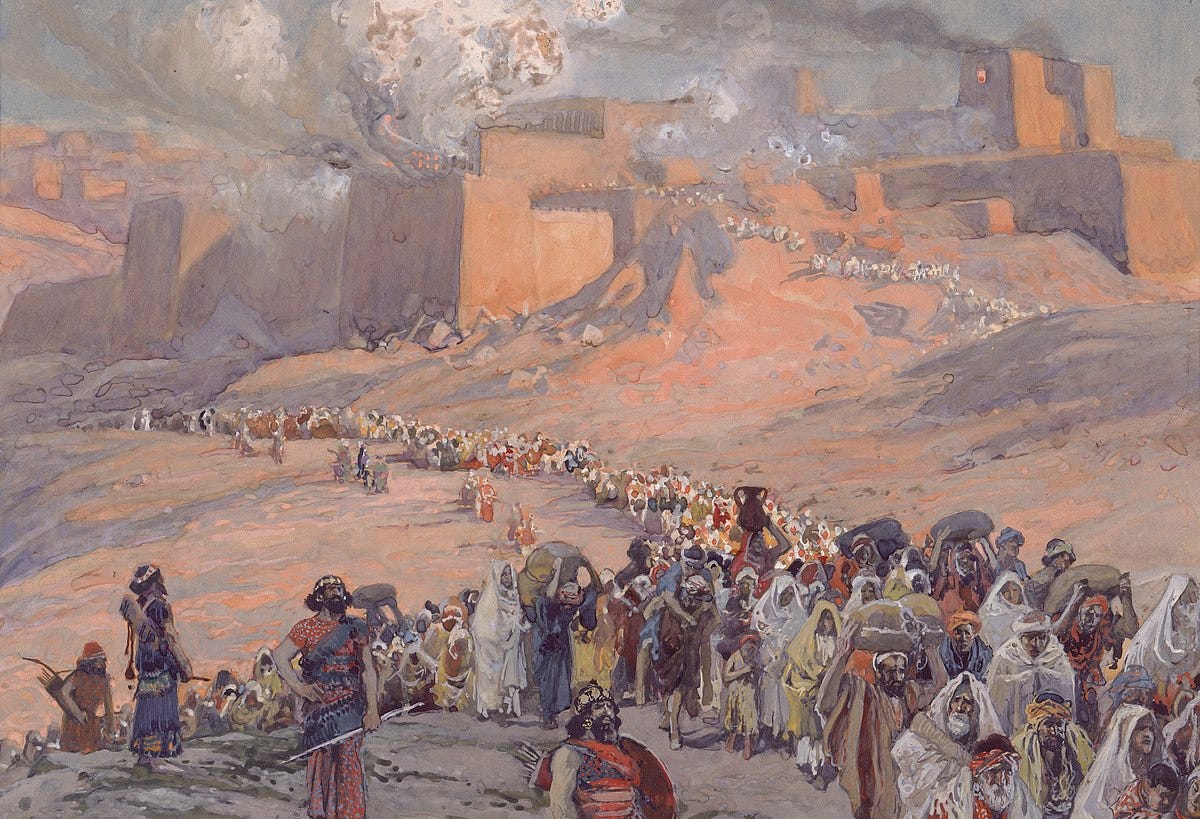In the end, all shall be well
A reflection for the Second Sunday of Advent
The first reading this Sunday is from the fifth chapter of the book of Baruch. The story of Baruch is set during the Babylonian Exile, when God’s People were held captive in Babylon. This is a dark time in the story of the Old Testament, one of the darkest.
The Temple of Jerusalem, built by King Solomon generations earlier, was destroyed and God’s People were forced out of the Promised Land. The Temple and the Land were great signs of God’s closeness and care for his people, but now they were lost. It’s difficult to overstate the grief and despair of this moment in Israel’s story.
In the first chapter of Baruch, the writer expresses the sorrow that Israel feels. They look back on generations of disobedience to the covenant they made with God, they look back on all of the warnings they had received from the prophets that spelled out the consequences of their disobedience, and they mourn. Baruch says:
“We did not heed the voice of the Lord our God in all the words of the prophets whom he sent to us, but we each followed the intent of his own wicked heart by serving other gods and doing what is evil in the sight of the Lord our God” (1:21).
This passage is meant to invoke the Garden of Eden, where the man and the woman did what was right in their own eyes instead of obeying God. In doing so, our first parents rejected the life of God that their Creator had breathed into them and chose to live under the sovereignty of death. When God confronted them about their disobedience, he explained to them the consequences of living under the reign of death: pain, toil, and suffering.
While exiled in Babylon, Israel recognizes that their suffering is a consequence of their own choices, of generations of disobedience, idolatry, and oppression of the poor. Yet, in the midst of this shame and grief, the passage of Baruch that we hear today is a message of hope, a proclamation that God will rescue them from their exile.
It’s important to note here that Israel’s hope is not in their power to rise up against Babylon and save themselves, nor is their hope placed in their ability to change their ways. Their hope is grounded precisely on God’s goodness and power, on the promises he made to them. God will rescue them. God will clear the obstacles in their path. God will bring them back to the Promised Land.
This reading isn’t only a message of hope for God’s People in exile 2,500 years ago. It’s a message of hope for us, for me, today. The Church is the New Jerusalem, the Body of Christ into which I was baptized. So I’m invited to read my own name into this reading:
Paul, take off your robe of mourning and misery;
put on the splendor of glory from God forever:
wrapped in the cloak of justice from God,
bear on your head the mitre
that displays the glory of the eternal name.
I cannot console my own grief or free myself from my own shame. As we hear in the Prayer over the Offerings, I “have no merits” to plead my cause, but instead trust that God, in his goodness and mercy, will rescue and protect me.
God meets me in my desolation. In Christ I can see a God who freely chose to experience the full weight of the reign of death, even the feeling of being utterly abandoned by his Father. He does not bypass the grief and despair. He meets me there, and the midst of the darkness he makes a promise of restoration. And not just restoration, but resurrection and glory.
The hope we’re invited into during this season of Advent isn’t a platitude, a kind word that bypasses the suffering we experience. But trust, given to me by God, and grounded in the truth of his goodness and power, that Christ has, does, and will meet me in the darkness. Trust that, in the end, all shall be well.
For God has commanded
that every lofty mountain be made low,
and that the age-old depths and gorges
be filled to level ground,
that I may advance secure in the glory of God.


